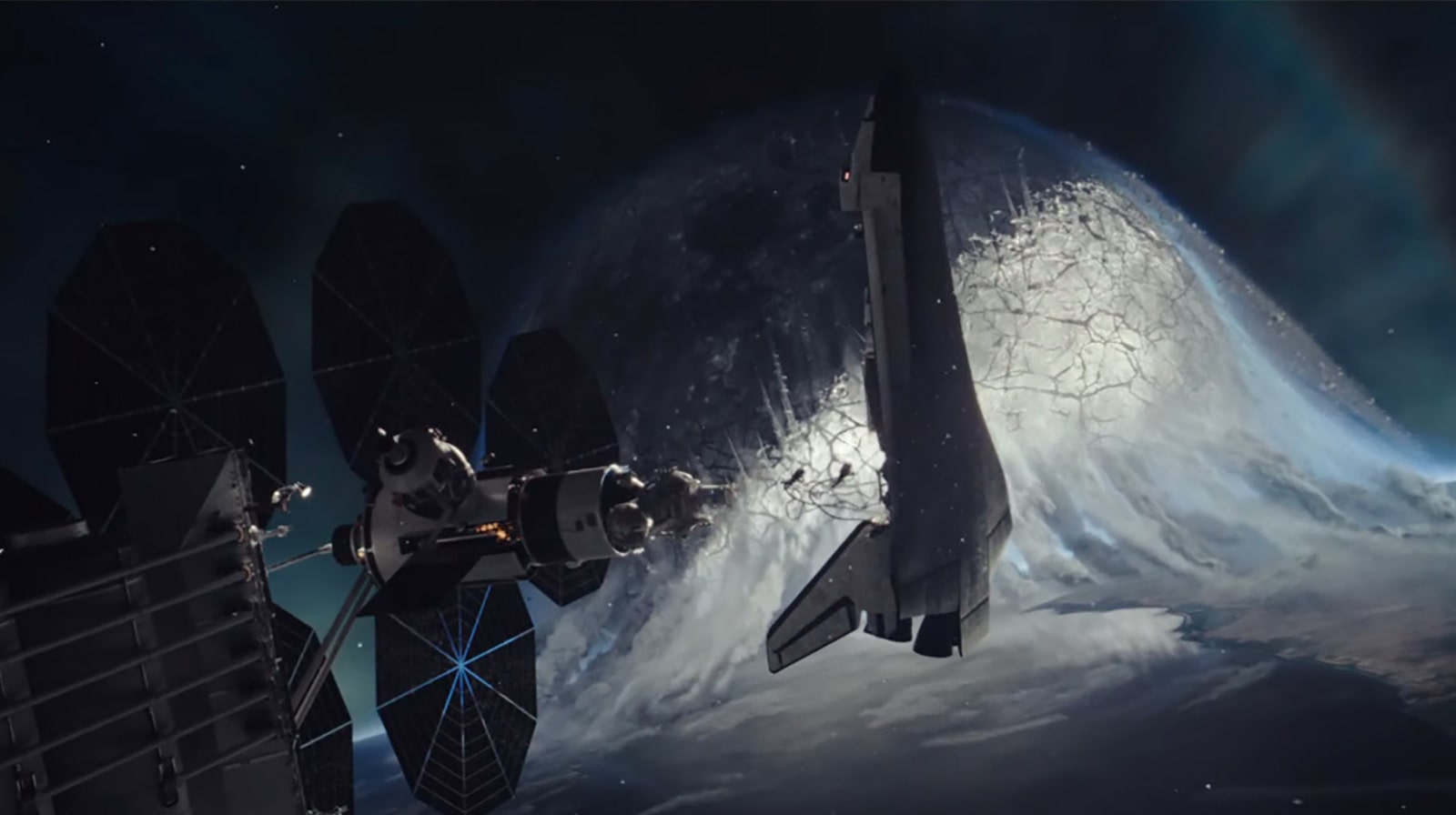An unexpected disaster has befallen our world, and no one is safe. No, I’m not talking about the still ongoing COVID-19 pandemic, I’m talking about the Lionsgate film opening today, Moonfall. Here’s the description, from Centropolis Entertainment:
In Moonfall, a mysterious force knocks the Moon from its orbit around Earth and sends it hurdling [sic] on a collision course with life as we know it. With mere weeks before impact and the world on the brink of annihilation, NASA executive and former astronaut Jo Fowler is convinced she has the key to saving us all – but only one astronaut from her past, Brian Harper and a conspiracy theorist K.C. Houseman believe her. These unlikely heroes will mount an impossible last-ditch mission into space, leaving behind everyone they love, only to find that they might have prepared for the wrong mission.
Does that sound like something you’d risk going to the theater for? Yes, we live in a time so difficult, Immanuel Velikovsky might think later generations will block their memories of it. Just like we forgot the first time the Moon zoomed around the solar system.

There is no dark side of the Moon, just a side that always faces away from us, but that’s the least of our concerns here.
A mid-20th century psychiatrist and devotee of Sigmund Freud and the now-discredited idea of repressed memories, Velikovsky was convinced that within the last several thousand years, the Moon, Mercury, Venus, and even Jupiter and Saturn all bounced around our cosmic neighborhood, without orbits, like giant, destructive billiard balls.
It wasn’t some grand geologic or astronomical discovery that brought Velikovsky to this revelation. Like Moonfall‘s K.C. Houseman and other conspiracy theorists, he started with the conclusion and worked backward from there. Instead of taking the Bible and other religious/mythological texts as parables, Velikovsky decided that when the Book of Joshua said the “Lord threw down great stones from Heaven,” it was literally true.
Without really articulating his reasoning, Velikovsky insisted that Venus was actually a comet that had been ejected by Jupiter, and Earth passing through its tail miraculously left us with both oil deposits and the “manna from Heaven” that sustained the Israelites after the Exodus. The impossible return of Venus caused Joshua’s miracle of stopping the Sun, which was actually a halting of the Earth’s rotation. Mercury was a moon of Jupiter before it buzzed past us, producing a “deep electrical shock” that made humanity forget its shared language, at the Tower of Babel.
Velikovsky admitted that these mind-bending events must have caused massive earthquakes, tsunamis, and widespread extinctions, and the horror of it all is what forced us to forget, except for what’s recorded in a few important texts. But there’d be so much more evidence if Velikovsky’s “catastrophism” were true. The “oil fall” from Venus would be found in glaciers. Records of global fires could be seen in tree rings. When asked his thoughts about Velikovsky’s “work,” Albert Einstein said it couldn’t have happened “without the total destruction of the entire Earth’s crust.”
Velikovsky wouldn’t budge though, saying that his work needed no revisions and it was the rest of science that had to be changed. Evolution happened not over thousands or millions of years, but in hours or weeks. Diamonds formed in they sky when Venus passed by. Velikovsky even rejected the very reality of gravity itself.
If that’s the craziest f*cking sh*t you’ve ever read, you’re not alone. Needless to say, nearly every serious scientist roundly dismissed Velikovsky’s catastrophism. His first book, Worlds in Collision, was rejected by eight publishers before he finally landed a deal in 1950. But once it got out there, Worlds and two subsequent volumes, Ages in Chaos (1952) and Earth in Upheaval (1955), were hugely popular among the public.
Today, we know the dangerous power of crazy ideas. In the mid-20th century, most scholars were content to ignore Velikovsky, seeing his nonsense as a distraction from their actual work. The famous astronomer and popularizer of science Carl Sagan finally did the math to definitively show Velikovsky’s catastrophes couldn’t happen, and publicly debated him in 1974, two years before Sagan helped found what’s now known as the Committee for Skeptical Inquiry (and the U.S. organized skepticism movement in general) in 1976.

And after that, popular interest in Velikovsky waned. Of course, he never started to doubt himself, but a rigorous defense of reality opened a lot of other people’s eyes. Debates don’t always work, as charismatic outsiders can often manipulate emotions better than stereotypically stuffy scientists, but if the people with the facts don’t find an effective way to get into the game, history — and current events — show that the wackos can win.
Every February, to help celebrate Darwin Day, the Science section of AIPT cranks up the critical thinking for SKEPTICISM MONTH! Skepticism is an approach to evaluating claims that emphasizes evidence and applies the tools of science. All month we’ll be highlighting skepticism in pop culture, and skepticism *OF* pop culture. For even more on Velikovsky, check out Daniel Loxton’s extensive yet succinct look at his rise and fall, which was the main source for this article.
AIPT Science is co-presented by AIPT and the New York City Skeptics.
Join the AIPT Patreon
Want to take our relationship to the next level? Become a patron today to gain access to exclusive perks, such as:
- ❌ Remove all ads on the website
- 💬 Join our Discord community, where we chat about the latest news and releases from everything we cover on AIPT
- 📗 Access to our monthly book club
- 📦 Get a physical trade paperback shipped to you every month
- 💥 And more!













You must be logged in to post a comment.